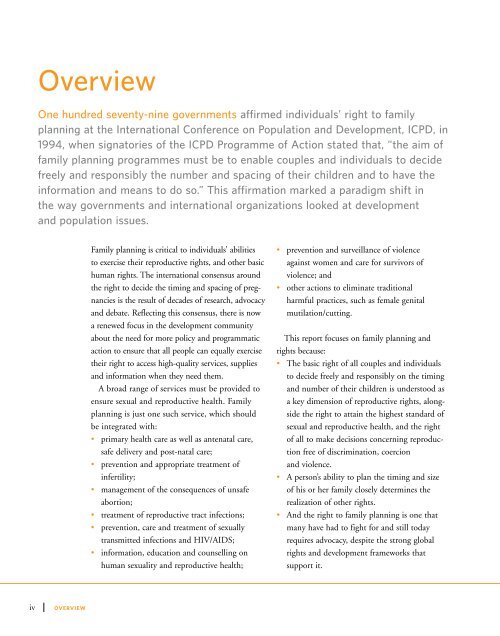State of World Population 2012 - Country Page List - UNFPA
State of World Population 2012 - Country Page List - UNFPA
State of World Population 2012 - Country Page List - UNFPA
You also want an ePaper? Increase the reach of your titles
YUMPU automatically turns print PDFs into web optimized ePapers that Google loves.
Overview<br />
One hundred seventy-nine governments affirmed individuals’ right to family<br />
planning at the International Conference on <strong>Population</strong> and Development, ICPD, in<br />
1994, when signatories <strong>of</strong> the ICPD Programme <strong>of</strong> Action stated that, “the aim <strong>of</strong><br />
family planning programmes must be to enable couples and individuals to decide<br />
freely and responsibly the number and spacing <strong>of</strong> their children and to have the<br />
information and means to do so.” This affirmation marked a paradigm shift in<br />
the way governments and international organizations looked at development<br />
and population issues.<br />
Family planning is critical to individuals’ abilities<br />
to exercise their reproductive rights, and other basic<br />
human rights. The international consensus around<br />
the right to decide the timing and spacing <strong>of</strong> pregnancies<br />
is the result <strong>of</strong> decades <strong>of</strong> research, advocacy<br />
and debate. Reflecting this consensus, there is now<br />
a renewed focus in the development community<br />
about the need for more policy and programmatic<br />
action to ensure that all people can equally exercise<br />
their right to access high-quality services, supplies<br />
and information when they need them.<br />
A broad range <strong>of</strong> services must be provided to<br />
ensure sexual and reproductive health. Family<br />
planning is just one such service, which should<br />
be integrated with:<br />
• primary health care as well as antenatal care,<br />
safe delivery and post-natal care;<br />
• prevention and appropriate treatment <strong>of</strong><br />
infertility;<br />
• management <strong>of</strong> the consequences <strong>of</strong> unsafe<br />
abortion;<br />
• treatment <strong>of</strong> reproductive tract infections;<br />
• prevention, care and treatment <strong>of</strong> sexually<br />
transmitted infections and HIV/AIDS;<br />
• information, education and counselling on<br />
human sexuality and reproductive health;<br />
• prevention and surveillance <strong>of</strong> violence<br />
against women and care for survivors <strong>of</strong><br />
violence; and<br />
• other actions to eliminate traditional<br />
harmful practices, such as female genital<br />
mutilation/cutting.<br />
This report focuses on family planning and<br />
rights because:<br />
• The basic right <strong>of</strong> all couples and individuals<br />
to decide freely and responsibly on the timing<br />
and number <strong>of</strong> their children is understood as<br />
a key dimension <strong>of</strong> reproductive rights, alongside<br />
the right to attain the highest standard <strong>of</strong><br />
sexual and reproductive health, and the right<br />
<strong>of</strong> all to make decisions concerning reproduction<br />
free <strong>of</strong> discrimination, coercion<br />
and violence.<br />
• A person’s ability to plan the timing and size<br />
<strong>of</strong> his or her family closely determines the<br />
realization <strong>of</strong> other rights.<br />
• And the right to family planning is one that<br />
many have had to fight for and still today<br />
requires advocacy, despite the strong global<br />
rights and development frameworks that<br />
support it.<br />
iv<br />
OVERVIEW
















